On October 28…
“Her upraised arm has saluted scores of ships as they have passed by. Her dignity has welcomed Americans returning home from foreign parts and has given hope to newcomers seeking a fresh beginning in the land of liberty.”
~Barry Moreno
Statue of Liberty Historian
==============================
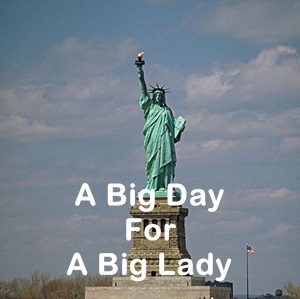
==============================

1818 – Abigail Adams, the wife of one president and mother of another, died of typhoid fever at the age of 73.
She is one of the most documented of the First Ladies: she is remembered for the many letters she wrote to her husband John while he stayed in Philadelphia, Pennsylvania, during the Continental Congresses.
Historian Joseph Ellis has found that the 1200 letters between John and Abigail “constituted a treasure trove of unexpected intimacy and candor, more revealing than any other correspondence between a prominent American husband and wife in American history.”
Abigail believed that slavery was evil and a threat to the American democratic experiment. A letter written by her on March 31, 1776, explained that she doubted most of the Virginians had such “passion for Liberty” as they claimed they did, since they “deprive[d] their fellow Creatures” of freedom.
Abigail Factoid: She was the first Second Lady and second First Lady of the United States. No, it doesn’t mean anything significant but I thought it was interesting. It’s just the way my mind works.
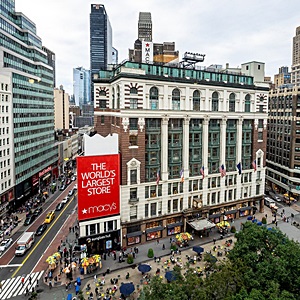
1858 – Rowland Hussey Macy established a new store named “R.H Macy Dry Goods” at Sixth Avenue on the corner of 14th Street, in Manhattan.
On the company’s first day of business, sales totaled $11.08, equal to $320.27 today.
Today there are 584 full-line stores with the Macy’s nameplate in operation throughout the United States, Puerto Rico, and Guam.
Macy’s Herald Square (shown above) in Manhattan, acts as the company’s flagship store. The company has 130,000 employees and earned annual revenue of $24.8 billion.
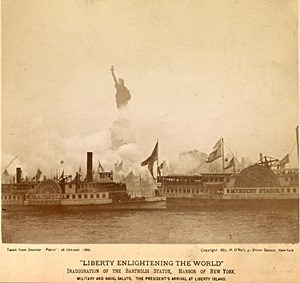
1886 – The Statue of Liberty, a gift from the people of France, was dedicated in New York Harbor by President Grover Cleveland.
Ferdinand de Lesseps, head of the Franco-American Union, made the first speech, on behalf of the French committee, followed by the chairman of the New York committee, Senator William M. Evarts.
A French flag draped across the statue’s face was to be lowered to unveil the statue at the close of Evarts’ speech, but French sculptor Frederic Auguste Bartholdi –who had designed the statue –mistook a pause as the conclusion and let the flag fall prematurely. The ensuing cheers put an end to Evarts’ address.
President Cleveland spoke next, stating that the statue’s “stream of light shall pierce the darkness of ignorance and man’s oppression until Liberty enlightens the world.”
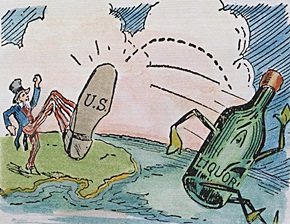
1919 – Congress enacted the Volstead Act, which provided for enforcement of Prohibition, over President Woodrow Wilson’s veto.
It was enacted to carry out the intent of the 18th Amendment which established prohibition in the United States.
It provided that “no person shall manufacture, sell, barter, transport, import, export, deliver, or furnish any intoxicating liquor except as authorized by this act.”
It did not specifically prohibit the purchase or consumption of intoxicating liquors. The act defined intoxicating liquor as any beverage containing more than 0.5% alcohol. This extremely low limit on allowed alcohol content, banning wine and beer, took many around the country by surprise, even Prohibition supporters.
Prohibition went into force at midnight on January 17, 1920.
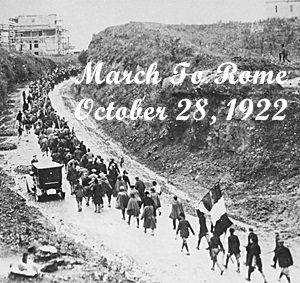
1922 – Italian fascists marched on Rome with a government overthrow as their goal.
On Oct. 24, the fascist party leaders had announced plans for an insurrection to take place on October 28, consisting of a march on Rome by fascist armed squads loyal to Benito Mussolini.
On October 28, the government of Prime Minister Luigi Facta (who had resigned but continued to hold power) ordered a state of siege for Rome to meet the threat posed by 30,000 fascist troops gathered outside Rome.
King Victor Emmanuel III, however, refused to sign the order. This meant that the army, which might have stopped Mussolini, was not called on to oppose the fascists.
On October 29, the King handed power to Mussolini, who was supported by the military, the business class, and the right-wing.
Traveling from Milan by train, Mussolini arrived in Rome on October 30.
He had legally reached power, in accordance with the Italian Constitution.
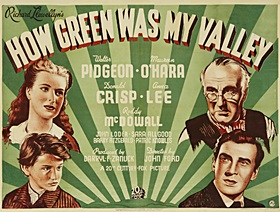
1941 – How Green Was My Valley premiered in New York City.
Directed by John Ford, the film featured Walter Pidgeon, Maureen O’Hara, Anna Lee, Donald Crisp, and Roddy McDowall.
It was nominated for ten Academy Awards, famously beating Citizen Kane for Best Picture along with winning Best Director, Best Supporting Actor (Crisp), Best Cinematography, and Best Art Direction.
Valley Factoid: 20th Century Fox wanted to shoot the movie in Wales, but events in Europe during World War II made this impossible.
Instead, John Ford had the studio build an 80-acre authentic replica of a Welsh mining town at Brent’s Crags in the Santa Monica Mountains near Malibu.
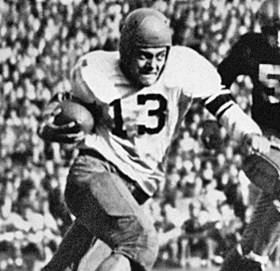
1953 – In a Canadian Football League playoff game against the Saskatchewan Roughriders, Bud Grant of the Winnipeg Blue Bombers intercepted 5 passes.
NFL fans should recognize his name. He later became the head coach of the Minnesota Vikings and was inducted into the Pro Football Hall of Fame in 1994.
Basketball Bud Factoid: Grant was a fourth round (forty-second overall) selection of the Minneapolis Lakers in the 1950 NBA draft. He played two seasons with the Lakers before turning his full time attention to football.
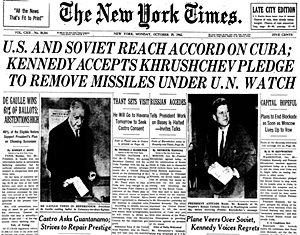
1962 – Soviet leader Nikita Khrushchev blinked.
In a broadcast over Radio Moscow, which he believed the U.S. would hear, Khrushchev stated that “The Soviet government, in addition to previously issued instructions on the cessation of further work at the building sites for the weapons, has issued a new order on the dismantling of the weapons which you describe as ‘offensive’ and their crating and return to the Soviet Union.”
He kept secret Kennedy’s private assurances on removing U.S. missiles from Turkey.
Kennedy immediately responded.
“The U.S. will make a statement in the framework of the Security Council in reference to Cuba as follows: it will declare that the United States of America will respect the inviolability of Cuban borders, its sovereignty, that it take the pledge not to interfere in internal affairs, not to intrude themselves and not to permit our territory to be used as a bridgehead for the invasion of Cuba, and will restrain those who would plan to carry an aggression against Cuba, either from U.S. territory or from the territory of other countries neighboring to Cuba.”
Aftermath: The U.S. continued the blockade; in the following days, aerial reconnaissance proved that the Soviets were making progress in removing the missile systems. The 42 missiles and their support equipment were loaded onto eight Soviet ships.
The ships left Cuba on November 5-9.
The U.S. made a final visual check as each of the ships passed the blockade line. Further diplomatic efforts were required to remove the Soviet Il-28 bombers, and they were loaded on three Soviet ships on December 5 and 6.
Concurrent with the Soviet commitment on the Il-28s, the U.S. government announced the end of the blockade from 6:45 pm EST on November 20, 1962.
What Kennedy Didn’t Know Factoid: At the time when the Kennedy administration thought that the Cuban Missile Crisis was resolved, nuclear tactical rockets stayed in Cuba since they were not part of the Kennedy-Khrushchev understandings and the Americans did not know about them.
The Soviets changed their minds, fearing possible future Cuban militant steps, and on November 22, Deputy Premier of the Soviet Union Anastas Mikoyan told Fidel Castro that the rockets with the nuclear warheads were being removed.
The last U.S. missiles were disassembled by April 24, 1963, and were flown out of Turkey soon afterward.
Because the withdrawal of the Jupiter missiles from NATO bases in Italy and Turkey was not made public at the time, Khrushchev appeared to have lost the conflict and become weakened.
The perception was that Kennedy had won the contest between the superpowers and that Khrushchev had been humiliated.
Both Kennedy and Khrushchev took every step to avoid full conflict despite pressures from their respective governments.
Khrushchev held power for another two years.
Kennedy was assassinated one year later.
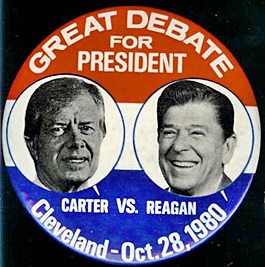
1980 – Republican nominee Ronald Reagan asked voters during a debate with President Jimmy Carter in Cleveland “are you better off than you were four years ago?”
Moments before taking the stage for his only debate with Ronald Reagan, President Jimmy Carter made a miscalculation that may have cost him reelection.
Backstage, Carter won a coin toss to determine who would field the night’s first question. He deferred to Reagan, which also meant Reagan would get the last word.
It was one week before Election Day, and despite a sluggish economy and a crisis in the Middle East, Carter held a slight lead in the polls.
For the first 87 minutes of the debate, Reagan parried Carter’s attacks. Then, at 11 p.m., he looked into the camera for his closing statement and addressed voters’ frustrations in a few epic lines.
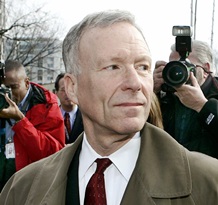
2005 – Vice President Dick Cheney’s Chief of Staff, I. Lewis “Scooter” Libby, resigned.
His resignation came after he was indicted on five counts by a federal grand jury concerning the investigation of the leak of the covert identity of Central Intelligence Agency officer Valerie Plame Wilson.
On March 6, 2007, Libby was found guilty on four of the five counts against him. He was sentenced to 30 months in prison, 2 years’ supervised release, a fine of $250,000, and a special assessment of $400.
On July 2, 2007, President George W. Bush commuted the 30 months portion of the sentence, but did not grant a pardon, despite requests from Cheney.
On November 3, 2016, the District of Columbia Court of Appeals granted Libby’s petition for reinstatement to the D.C. Bar.
On April 13, 2018, President Donald Trump pardoned Libby.
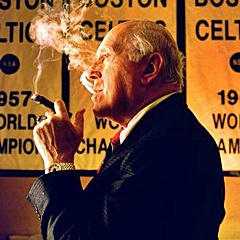
2006 – Hall of Fame basketball coach Arnold “Red” Auerbach died of a heart attack at the age of 89.
In two decades of NBA coaching, Auerbach won 938 games as well as a nine NBA championships with the Boston Celtics.
Later, as the team’s general manager, he would engineer deals for Larry Bird, Kevin McHale, Robert Parish, and Dave Cowens – all of whom also are in the Hall of Fame.
Proof of Auerbach’s impact on the game as both a coach and talent evaluator is the number of his players who made it to the Hall of Fame (14) and the number of his players who became coaches (30), including eight of the 12 players on his 1962-63 championship team.
Auerbach was inducted into the Basketball Hall of Fame in 1969 and, 11 years later, was recognized as the greatest coach in NBA history by the Professional Basketball Writers Association of America.
That same year, 1980, he was inducted a second time into the Hall of Fame in recognition of his contributions to the game.
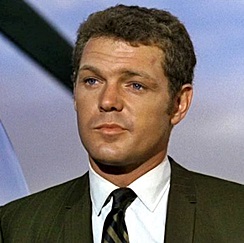
2010 – Actor James MacArthur died of cancer at the age of 72.
The son of Academy Award winning actress Helen Hayes, MacArthur first drew national attention with appearances in two 1960 Disney movies, Kidnapped and Swiss Family Robinson.
Other film roles included The Interns, Spencer’s Mountain, The Bedford Incident, and Battle of the Bulge.
After appearing briefly in Clint Eastwood’s Hang ‘Em High, MacArthur was offered the role of Danny “Danno” Williams on Hawaii Five-0, a role he played for 11 seasons before abruptly quitting in 1979, one year before the series ended.
“It was just time,” he later said. “I grew bored. The stories became more bland and predictable.”
Book ‘Em Factoid: Where did the phrase “Book ’em, Danno” come from? MacArthur said series star Jack Lord “said ‘book him’ to others in the cast, but I guess he said it to me the most. It wasn’t anything we really thought about at first. But the phrase just took off and caught the public’s imagination.”
Compiled by Ray Lemire ©2019 RayLemire.com / Streamingoldies.com. All Rights Reserved.